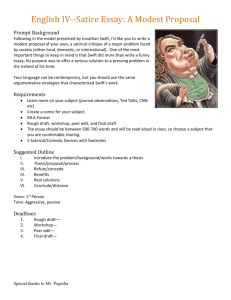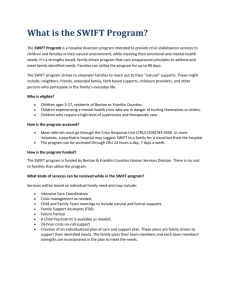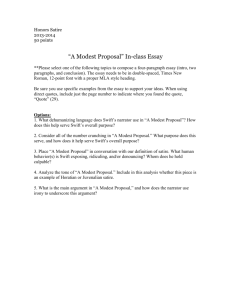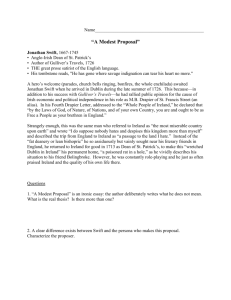A Modest Proposal x2 - Sites at Penn State
advertisement
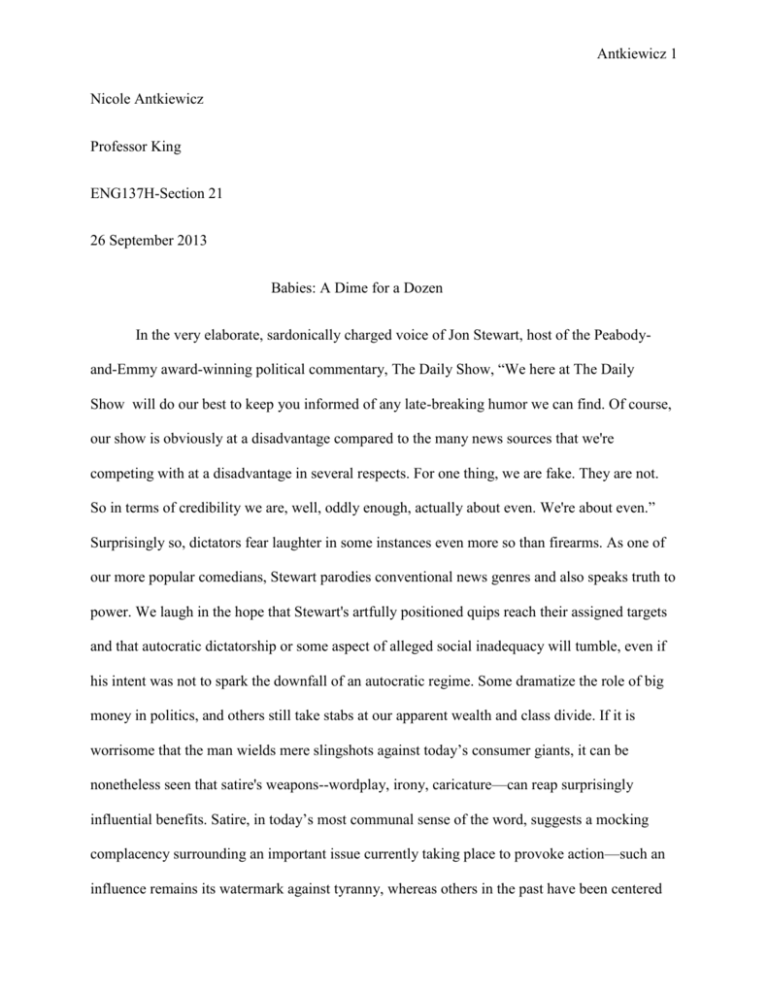
Antkiewicz 1 Nicole Antkiewicz Professor King ENG137H-Section 21 26 September 2013 Babies: A Dime for a Dozen In the very elaborate, sardonically charged voice of Jon Stewart, host of the Peabodyand-Emmy award-winning political commentary, The Daily Show, “We here at The Daily Show will do our best to keep you informed of any late-breaking humor we can find. Of course, our show is obviously at a disadvantage compared to the many news sources that we're competing with at a disadvantage in several respects. For one thing, we are fake. They are not. So in terms of credibility we are, well, oddly enough, actually about even. We're about even.” Surprisingly so, dictators fear laughter in some instances even more so than firearms. As one of our more popular comedians, Stewart parodies conventional news genres and also speaks truth to power. We laugh in the hope that Stewart's artfully positioned quips reach their assigned targets and that autocratic dictatorship or some aspect of alleged social inadequacy will tumble, even if his intent was not to spark the downfall of an autocratic regime. Some dramatize the role of big money in politics, and others still take stabs at our apparent wealth and class divide. If it is worrisome that the man wields mere slingshots against today’s consumer giants, it can be nonetheless seen that satire's weapons--wordplay, irony, caricature—can reap surprisingly influential benefits. Satire, in today’s most communal sense of the word, suggests a mocking complacency surrounding an important issue currently taking place to provoke action—such an influence remains its watermark against tyranny, whereas others in the past have been centered Antkiewicz 2 more on stunning its audience. This was shown more in “A Modest Proposal” by Jonathan Swift than any else, the most prodigious and famous satire of its time in the 1720’s—when the Irish potato famine was more than prevalent, empowered by destitute families and elite, ruling class dominance and its strangle-hold, although ultimately unsuccessful in gauging an appropriate audience reaction from the political and social elite those of whom were the essay’s target audience. Through stark, emotionally-charged, organic realism and logical, hard-edged economic reasoning as well the maintenance of a self-righteous moral stance, Swift pushes adamantly for his proposed way of turning this overpopulation problem and economic detrimentality into its own unique positivity: the abstract notion of devouring the babies of the malnourished and destitute to improve social, moral, and economic sanctions of the nation of Ireland, and more specifically, of Dublin. His proposal, being that children of the poor will be dutifully sold off to a meat market to combat poverty and assuage the rich is largely substantiated by hard-based, factual claims that underscore his central motif: to casuistically mock the traditional sustenance conservation methods of the nobility that have since abandoned the poor and left them to suffer. Artistically so, he waits for a while to directly state his thesis: he builds up suspense and intrigue by hoping the reader will piece the facts together. The city of Dublin is in complete disarray, and the societal underpinnings of the institution are in dismembered shambles left in wrought out heaps by the wealthy few—Swift targets and attacks the held authority of the few members of the gentile class of whose general interests are solely of their own, although he is, in fact, one belonging to the English-Irish upper-middle class himself. Although contradictory, it is possible to arduously reprove or amend the system in which one is placed, while still remaining entirely dependent on it. Those countermeasures of the wealthy and privileged to combat the potato Antkiewicz 3 famine’s vicious nature have proved fruitless after much time spent in idle speculation, inspiring Swift to write out in defense—a juxtaposition of models of sustainability to say that not only do these offered methods don’t and will not work, but also that the nobility, as a whole, are selfcentered and apathetic to the plight of the poor and something must be done in the way of social and economic reforms. That is the central, underlying point of his essay, not to physically eat babies, as he so callously suggests just to get a rouse out of the gentile. The author, meanwhile, offers statistical support for his assertions to flesh them out, and gives specific data about the number of children to be sold, their weight and price, and the projected consumption patterns to increase his claim’s persuasive power, and increase its supposed accuracy to his audience. Swift calculates numbers as such, “The number of souls in this kingdom being usually reckoned one million and a half, of these I calculate there may be about two hundred thousand couple whose wives are breeders; from which number I subtract thirty thousand couples who are able to maintain their own children” (Pararaph six). Such economic transactions would better the individual families by providing for them a more established income while alleviating the effects of poverty; the economy as a whole would also be further solidified, Swift suggests. With tongue-in-cheek tone ablaze, the diction of “breed” and “breeders” repeated several times throughout the piece channels an ironic understatement central to the genre of satire itself, and of Swift’s so elegantly poised suggestion. Dehumanization is the central element when invoking this phrase and specific kind of diction--the connotation of which demoralizes society, and the people by which society is sustained most of all: women. Familial and communal ties are strewn and strayed in relation to dark economic times—the kairos that so abjectly fuels the fire of the essay itself—and are further made disassembled by the prospect of feasting upon the flesh of the product of a family’s love, or at least, that is the assertion that one would assume. Swift Antkiewicz 4 retorts negatively in his counterargument, ardently prophesying that familial ties will be strengthened, but only in the way of economic, not amorous gain—women will be more careful when with child to preserve the possibility of a proper birth and to prevent miscarriages, and men will care more for their wives as if they were merely “mares in foal, their cows in calf, their sows when they are ready to farrow; nor offer to beat or kick them (as is too frequent a practice) for fear of a miscarriage” (Paragraph 26). Just as there is a direct contrast drawn between Swift’s model and the previous models aforesaid historically mentioned, there is a compare and contrast element to the poignant, heartbreakingly dramatic imagery brought forth with the begging women with their children on the dusty streets, in comparison to steaming, roasting baby carcasses being placed on a wooden table in front of an open fire. His overall conclusion is that the implementation of this project will do more to solve Ireland's complex social, political, and economic problems by breaking the poverty barrier more so than any other measure that has been previously proposed. The essay is a direct call to unity; Swift relies on other trusted friends’ advice on the subject matter of Irish famine and the social class divide, and as to what pains should be taken to assuage particular complications—proving that Swift himself is unknowledgeable of the logistics of his own subject matter to a certain degree. He is “assured by” (Paragraph 7) his merchants, and “assured by very knowing American” (Paragraph 9) of his acquaintance in London. In fact, one could go so far as to say he is almost unqualified to speak on such a matter, aside from being one of the gentry himself, as he has no children to offer and could not possibly understand the sentiment of sacrificing one for the economic and moral “bettering” of society, and this inadequacy to speak on behalf of this subject fuels his ironic, nonsensical, satiric voice. Notwithstanding his lack of familial ties, his wife is also above child-rearing age, so she would Antkiewicz 5 also not be put into danger; therefore, Swift cannot possible relate to the consequences of his mentioned plan—being separated from the penalties and magnitudes of such actions just as the commonwealth is separated from the starving lower classes. He constantly relies on his wise friends’ opinions on economics and the subject matter at hand which is also ironic because he claims that this is solely an Irish issue, and that is the reason why nothing else like this has been proposed elsewhere, and yet he uses the advice and structural systems of his friends from other countries and continents. As enunciated beforehand, the combination of statistical evidence, emotionally infused, yet archaic diction, and the reliance on friends’ advice casts a precariously foolish light on Swift as a speaker, which, in turn, led him ultimately to not achieve the desired effect of making a drastic change, and survived as no more of a purpose than a comic or a silly joke in the paper. Historically, he was laughed at for his efforts tried in vain. He makes consistent references to friends and societal standards while going against the grain; we all must give to better Dublin and to pull it from this hole, but some people, namely the poor, must pull a little more—that is what the essay states at face value, when in fact, its underlying, true goal, is in knocking the worthless, prestigious upper class members off of their illustrious pedestal. Honestly, satire hasn’t changed all that much, as modern entities still echo the same message by Jon Stewart: “I've always run by the hierarchy of ‘If not funny, interesting.’” Still care for a freshly cooked baby?
